#filonis stuff too so its very much not just in the old material
Note
i don't mean this as an attack, but if you're going to condemn Dune for orientalism, you should be doing the same for Star Wars
I mean yea star wars sucks
#i dont mean this dismissively. im native dude do you think i enjoy star wars uncritically.#yes star wars has So many issues and often the same issues as dune because of how heavily inspired by it it was#and yes it was very much a guy that doesnt understand eastern philosophies trying to base his world on them and that issue continues with#filonis stuff too so its very much not just in the old material#and the fandom takes it the wrong inverse direction with making fun of the jedi's philosophy as stupid when it exists in real world cultures#when some of the aspects that are made fun of are from real world cultures i mean#so yes youre very right.#i suppose i havent been sharing as many critical star wars posts. i thought i was
3 notes
·
View notes
Photo
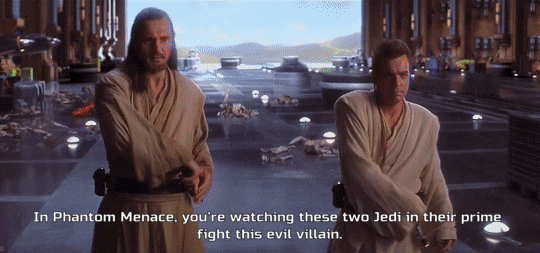
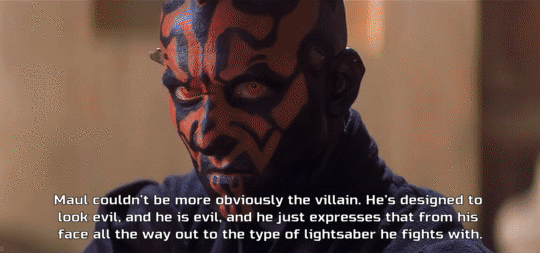


OKAY, IF I’M GONNA DO THIS, I’M GONNA DO IT PROPERLY. WHICH MEANS YEAH IT’S GONNA GET REALLY LONG.
A couple of things to say ahead of time: Lucasfilm’s Story Group has always said CANON > WORD OF GOD when it comes to these matters, so when I quote canon examples from supplementary materials that contradict what he says, that’s LF’s official position, but that doesn’t mean that an influential person like Dave’s views couldn’t affect how things will be shaped in the future, like Deborah Chow listening to this may be influenced by it on the Obi-Wan show, despite that Master & Apprentice contradicts him. It’s an incredibly murky area! Mileages are going to vary.
Another thing to keep in mind is that Dave Filoni never worked on The Phantom Menace, that was long, long before his time at Lucasfilm (which I think he joined sometime around 2007? and TPM was released in 1999), that he has worked with George more than probably anyone else, but we cannot and should not treat him as infallible or the True Authority on things, because even Dave himself has said things like:
“I mean, I know why I did that and what it means, but I don't like to explain too much. I love for the viewers to watch stuff and come up with their own theories -- and they frankly come up with better things that I intended.” --Dave Filoni, Entertainment Tonight 2020 interview
Or, in the same episode as the above Qui-Gon interpretation:
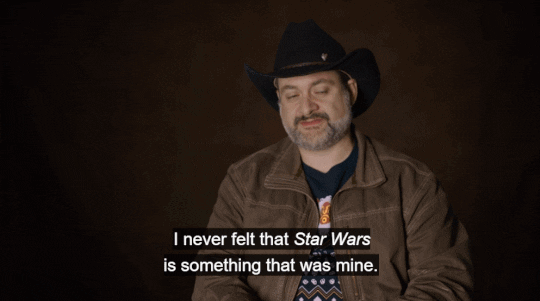


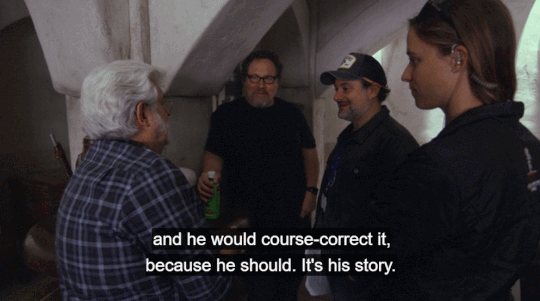
So, when I dig into this, I’m not doing this out of a sense of malice or even that I suddenly hate Dave or don’t appreciate all the incredible things he’s brought to SW, but in that I disagree with his take, Dave understands that he doesn’t always get it right, that he enjoys that fans come up with different things than he does and sometimes he likes those even more. There’s room for both of us and, for all that Dave mentions George a lot (and, hey, fair enough, the guy worked with George and I’m just quoting what George Lucas has said) doesn’t mean that this is straight from George, especially because I have never seen George Lucas utter so much as a peep about how the Jedi were responsible for Anakin’s fall. He has explicitly and frequently talked about how Anakin’s fall was his own choice, as well as I’ve never seen him say anything Jedi-critical beyond “they were kind of arrogant about themselves”. I have read and watched every George Lucas interview I could get my hands on and maybe I’m still missing something, but that’s literally the extent of him criticizing the Jedi I have EVER seen.
(It’s from the commentary on AOTC where he put in the scene with Jocasta to show they were full of themselves, but I also think it’s fair to point out that Obi-Wan immediately contradicts this by going to Dex for help, showing that it’s not necessarily a Jedi-wide thing.)
Before I go further, I want to say: this is not a post meant to tear down Qui-Gon, he is a character I actually really do love, but the focus is on showing why the above interpretation of him is wrong, which means focusing on Qui-Gon’s flaws. He has many wonderful qualities, he is someone who cared deeply and was a good person, I think things would have been better had he lived! But Anakin’s choices did not hinge on him, because Anakin’s choices were Anakin’s, that has always been the consistent theme of how George talks about him, the way he talks about the story is always in terms of “Anakin did this” or “Anakin chose that”, and the Jedi are very consistently shown as caring, they believed very much in love and Dave’s own show (well, I say “his own show”, but honestly TCW was George’s baby primarily and he had a lot of direct, hands-on say in crafting it, through at least the first five seasons) is plenty of evidence of that.
I’m not going to quote the full thing because this is already a monster post, I’m just going to focus on the Jedi stuff, because I like the other points a lot, but if you want the full text, it’s here. The relevant part is:
“In Phantom Menace, you’re watching these two Jedi in their prime fight this evil villain. Maul couldn’t be more obviously the villain. He’s designed to look evil, and he is evil, and he just expresses that from his face all the way out to the type of lightsaber he fights with. What’s at stake is really how Anakin is going to turn out. Because Qui-Gon is different than the rest of the Jedi and you get that in the movie; and Qui-Gon is fighting because he knows he’s the father that Anakin needs. Because Qui-Gon hasn’t given up on the fact that the Jedi are supposed to actually care and love and that’s not a bad thing. The rest of the Jedi are so detached and they become so political that they’ve really lost their way and Yoda starts to see that in the second film. But Qui-Gon is ahead of them all and that’s why he’s not part of the council. So he’s fighting for Anakin and that’s why it’s the ‘Duel of the Fates’ – it’s the fate of this child. And depending on how this fight goes, Anakin, his life is going to be dramatically different.
“So Qui-Gon loses, of course. So the father figure, he knew what it meant to take this kid away from his mother when he had an attachment, and he’s left with Obi-Wan. Obi-Wan trains Anakin at first out of a promise he makes to Qui-Gon, not because he cares about him. When they get Anakin, they find him on Tatooine, he says “Why do I feel like we’ve found another useless lifeform?” He’s comparing Anakin to Jar Jar and he’s saying “this is a waste of our time, why are we doing this, why do you see importance in these creatures like Jar Jar Binks and this ten-year-old boy? This is useless.”
“So, he’s a brother to Anakin eventually but he’s not a father figure. That’s a failing for Anakin. He doesn’t have the family that he needs. He loses his mother in the next film. He fails on this promise that he made, “mother, I’m going to come back and save you”. So he’s left completely vulnerable and Star Wars is ultimately about family. So that moment in that movie which a lot of people I think diminish, “oh there’s a cool lightsaber fight”, but it’s everything that the entire three films of the prequels hangs on, is that one particular fight. And Maul serves his purpose and at that point died before George made me bring him back, but he died.“ --Dave Filoni
I’m going to take this a piece at a time to show why I really disagree with the content of both the movies and The Clone Wars supporting what Dave says and, instead, contradicts it a lot.
The rest of the Jedi are so detached and they become so political that they’ve really lost their way and Yoda starts to see that in the second film.
He doesn’t explain what this means, but I’m pretty sure that he’s referring to this conversation:
OBI-WAN: “I am concerned for my Padawan. He is not ready to be given this assignment on his own yet.”
YODA: “The Council is confident in its decision, Obi-Wan.”
MACE WINDU: “The boy has exceptional skills.”
OBI-WAN: “But he still has much to learn, Master. His abilities have made him... well.... arrogant.”
YODA: “Yes, yes. A flaw more and more common among Jedi. Hmm... too sure of themselves they are. Even the older, more experienced ones.”
MACE WINDU: “Remember, Obi-Wan, if the prophecy is true, your apprentice is the only one who can bring the Force back into balance.”
OBI-WAN: "If he follows the right path.”
None of that has anything to do with being “detached” and, further, I think this is something that’s come up with Dave’s view of Luminara a lot, because he’s described her (re: the Geonosis arc): “We were trying to illustrate the difference between the way Anakin is raising his Padawan, and how much he cares about her, and the way Luminara raises her Padawan. Not that Luminara is indifferent, but that Luminara is detached. It’s not that she doesn’t care, but she’s not attached to her emotionally.”
Here, he says that the Jedi care, in the above, he says that the Jedi don’t care, which makes me think there’s a lot of characterization drift as time goes on, especially when fandom bombards everyone with the idea that the Jedi were cold, emotionless, and didn’t care. However, look at Luminara’s face in that arc, when she’s talking with Anakin:
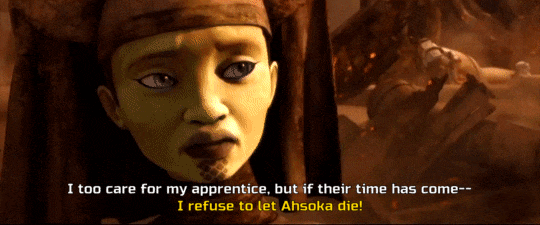
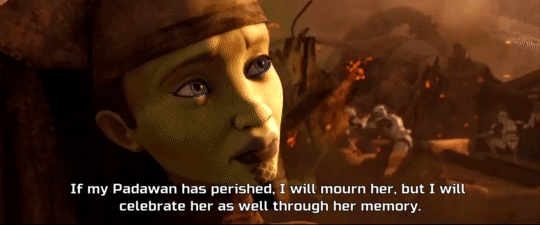
That is not the face of someone who doesn’t care. She even smiles brightly in relief when Barriss is shown to be okay, that this really doesn’t convey “detached” in an unloving or uncaring way. (We’ll get to attachment later, that’s definitely coming.)
(I’m also mostly skipping the political thing, because I think that’s just a fundamental disagreement of whether Jedi should or should not lean into politics. My view basically boils down to that I think ALL OF US should be leaning more into politics because we are citizens who live in the world and are responsible for it, and the Jedi are no different. This is evidenced by:
- M&A’s storyline has Qui-Gon and Obi-Wan saving the day specifically because they play politics, that’s how they manage to free the slaves, through playing politics and being part of the Republic/having Senate backing.
- The Clone Wars has shown that the Jedi believe “lasting change can only come from within” and “it’s every citizen’s duty to hold their leaders accountable” when Ahsoka teaches the cadets on Mandalore, as well as that politics are not inherently bad, given that Padme and Bail are working to make the system better or “create lasting change from within [the system]”
- "Trying to serve the greater good does not always make you popular” says Padme Amidala in a very caring speech
- Star Wars Propaganda makes the case that the Jedi might have won the war had they leaned more into politics.
- Sometimes the Jedi get unfairly accused of playing politics when there’s just no good choice and they still have to choose one or the other.)
But Qui-Gon is ahead of them [re: caring and loving] all and that’s why he’s not part of the council.
This is flat-out wrong in regards to canon. Mileages are going to vary, of course, on how much one takes a novel into consideration, but Dave Filoni is not a fan with the luxury of deciding what is or isn’t canon, he works on Star Wars where canon is canon. Now, does that mean canon will never contradict itself, especially if Dave gets to write something for Qui-Gon? Of course not, SW isn’t immune to continuity errors and they themselves have never said otherwise, even when fans want to hold them to that standard.
However, this is still pretty much a big “that’s not what happened” instance. In Master & Apprentice, the Jedi Council offer a seat to Qui-Gon on the Council, specifically BECAUSE he has different opinions from them and they welcome that. (Excerpt here.)
“We hope it will also be our gain,” Mace replied. “Qui-Gon Jinn, we hereby offer you a seat on the Jedi Council.”
Had he misheard? No, he hadn’t. Qui-Gon slowly gazed around the circle, taking in the expressions of each Council member in turn. Some of them looked amused, others pleased. A few of them, Yoda included, appeared more rueful than not. But they were serious.
“I admit—you’ve surprised me,” Qui-Gon finally said.“I imagine so,” Mace said drily. “A few years ago, we would’ve been astonished to learn we would ever consider this. But in the time since, we’ve all changed. We’ve grown. Which means the possibilities have changed as well.”
Qui-Gon took a moment to collect himself. Without any warning, one of the turning points of his life had arrived. Everything he said and did in the next days would be of great consequence. “You’ve argued with my methods often as not, or perhaps you’d say I’ve argued with yours.”
“Truth, this is,” Yoda said.
Depa Billaba gave Yoda a look Qui-Gon couldn’t interpret. “It’s also true that the Jedi Council needs more perspectives.”
Ultimately, Qui-Gon is the who turns them down and gives up a chance to shape the Jedi Council because he doesn’t like the shape they’re taking. That he does become less political, but this is after he’s argued that the Jedi should be working to push the Senate harder, so when he has a chance to help with that, he turns it down. It has nothing to do with caring and loving, it’s about Qui-Gon’s desire to not have to deal with the work himself, when he wants to be more of a hippie Jedi. (I’ve written a lot about Qui-Gon in M&A, why I actually think it’s really spot-on to someone who can be both really kind and really kind of a dick, but it’s not the most flattering portrayal, even if narrative intention likely didn’t mean what came across to me. I think this post and this post are probably the most salient ones, but if you want something of an index of the web that’s being woven with all the various media, this one is good, too.)
So he’s fighting for Anakin and that’s why it’s the ‘Duel of the Fates’ – it’s the fate of this child. And depending on how this fight goes, Anakin, his life is going to be dramatically different.
I have only ever seen George Lucas talk about Anakin’s fate in one instance and it’s this: “It’s fear of losing somebody he loves, which is the flipside of greed. Greed, in terms of the Emperor, it’s the greed for power, absolute power, over everything. With Anakin, really it’s the power to save the one he loves, but it’s basically going against the Fates and what is natural.“ –George Lucas, Revenge of the Sith commentary
I’ve made my case about why I think Anakin’s fate is about that moment in Palpatine’s office, and so I’m not fundamentally opposed that “Duel of the Fates” is about Anakin’s fate, but here’s what George has provably said about the “Duel of the Fates” part of the story:
- In the commentary for The Phantom Menace during “Duel of the Fates” and none of Dave’s speculation is even hinted at, there’s more focus on the technical side of things and the most George talks about is that it’s Obi-Wan who parallels Luke in going over the edge during the fight, except that instead of a Sith cutting off a Jedi’s hand, it’s a Jedi cutting a Sith in half, drawing the parallels between them.
- He does say of the funeral scene that this is where Obi-Wan commits to training Anakin and how everything is going to go (though, in canon we see that Obi-Wan still struggles with this a bit, but Yoda is there to support him and nudge him into committing even more to Anakin, because the Jedi are a supportive community to each other). This is some solid evidence for that Obi-Wan is already caring about Anakin beyond just Qui-Gon.
- Then here’s what he says about the “Duel of the Fates” fights and themes of them in "All Films Are Personal":
George Lucas: “I wanted to come up with an apprentice for the Emperor who was striking and tough. We hadn’t seen a Sith Lord before, except for Vader, of course. I wanted to convey the idea that Jedi are all very powerful, but they’re also vulnerable — which is why I wanted to kill Qui-Gon. That is to say, “Hey, these guys aren’t Superman.” These guys are people who are vulnerable, just like every other person.
“We needed to establish that, but at the same time, we wanted the ultimate sword fight, because they were all very good. It sort of predisposes the sword fight between Anakin and Obi-Wan later on. There’s real purpose to it. You have to establish the rules and then stick with them. The scene illustrates just how Jedi and Sith fight and use lightsabers.”
“So Qui-Gon loses, of course. So the father figure, he knew what it meant to take this kid away from his mother when he had an attachment, and he’s left with Obi-Wan. Obi-Wan trains Anakin at first out of a promise he makes to Qui-Gon, not because he cares about him.
We’ll get to the “attachment to his mother” thing in a bit--but, for now, let’s just say, George Lucas’ words on this are not that attachment to her was a good thing.
Fair enough that “not because he cares about him” is up to personal interpretation, but canon has also addressed the topic of Obi-Wan’s treatment of Anakin and Obi-Wan stepped up to the plate on this. In addition to how we see Obi-Wan REPEATEDLY being there for Anakin and being concerned and caring about him, they specifically talk about Qui-Gon and overcome this hurdle.
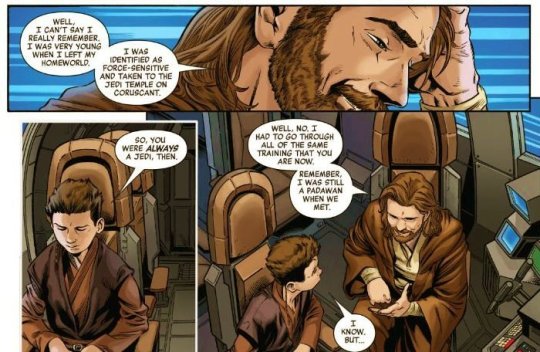
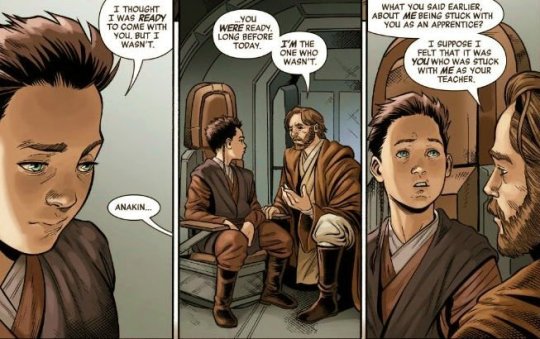
No, Obi-Wan is not Anakin’s father figure, on that we definitely agree. Anakin never really even treats Obi-Wan like a father--he says “you’re the closest thing I have to a father” in Attack of the Clones, as well as he says Obi-Wan practically raised him in The Clone Wars “Crystal Crisis” story reels, but Anakin has never actually acted like Obi-Wan is his father--”then why don’t you listen to me?” Obi-Wan points out in AOTC--as well as Obi-Wan glides past those remarks, which I’ve always taken that he doesn’t want to reject Anakin’s feelings, knowing that Anakin can be sensitive about them, but neither does he want to confirm them.
This does not mean Obi-Wan was not supportive, caring, and loving. He says, “I loved you!” to Anakin in Revenge of the Sith, he asks after him and if he’s sleeping well in Attack of the Clones, and even George Lucas himself said that the elevator scene was set up TO SHOW OBI-WAN AND ANAKIN CARE FOR EACH OTHER:
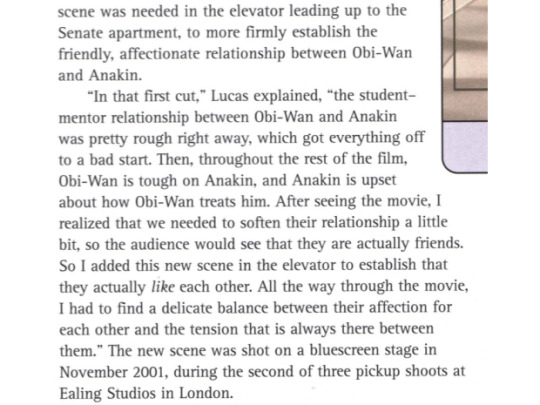
PUTTING THE REST UNDER A READ MORE FOR A BETTER LENGTH REBLOGGABLE VERSION, IF YOU WANT.
This is further evidenced by how the Jedi do see themselves as family, they just don’t need to put it into strict nuclear family dynamics:
- “You were my brother, Anakin! I loved you!” [–Obi-Wan Kenobi, Revenge of the Sith]
- “We are brothers, Master Dibs.” [–Mace Windu, Jedi of the Republic - Mace Windu]
- “Did your parents bicker?” she asked. “The adoptive ones, I mean.”
A slow smile broke across Ashla’s face, curling first one side of her mouth and then the other. Whatever she was remembering, Kaeden could tell it was good.
"All the time,“ Ashla said, almost as if she were talking to herself. [–Kaeden Larte, Ahsoka Tano, Ahsoka]
- Vos, brought to the Temple even younger than most, felt that he had hundreds of brothers and sisters, and it seemed that whenever he went into the dining hall he ran into at least half of them. [Dark Disciple]
- “It was not his birthplace, exactly, but the Jedi Temple was where Quinlan Vos had grown up. He’d raced through its corridors, hidden behind its massive pillars, found peace in its meditation hall, ended-and started-fights in rooms intended for striking blows and some that weren’t, and sneaked naps in its library. All Jedi came here, at some point in their lives; for Quinlan, it always felt like coming home when he ran lightly up the stairs and entered the massive building as he did now.” [Dark Disciple]
Brothers, sisters, and other more non-traditional kinds of family are not lesser and Obi-Wan and Anakin absolutely were family, just as the Jedi are all family to each other, so, no, there was no “failing” Anakin, except in Anakin’s mind, perhaps. (In that, I can agree. But not on a narratively approved level, canon too thoroughly refutes that for me.)
Rebels as well pretty thoroughly shows that non-traditional families are meaningful and just as important--we may joke that Hera is “space mom”, but she’s not actually Ezra or Sabine’s mother, Kanan is not actually their father, and even if they sometimes stray into aspects of those roles (as the Jedi do as well in the movies and TCW), that they don’t need that traditional nuclear family structure. Mentor figures--and Kanan is Ezra’s mentor--are just as meaningful and needful as a “dad”. And I’m kind of :/ at the implication that anyone without a dad/father figure or mom/mother figure is being “failed”.
When they get Anakin, they find him on Tatooine, he says “Why do I feel like we’ve found another useless lifeform?” He’s comparing Anakin to Jar Jar and he’s saying “this is a waste of our time, why are we doing this, why do you see importance in these creatures like Jar Jar Binks and this ten-year-old boy? This is useless.”
Whether or not Obi-Wan is being genuinely dismissive in this movie (I think you could make a case either way), the idea that Qui-Gon is better than Obi-Wan about this, as shown through Jar Jar isn’t exactly very supported given how Qui-Gon and Jar Jar first exchange words:

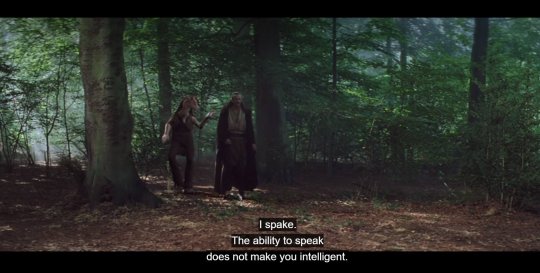
QUI-GON: “You almost got us killed. Are you brainless?”
JAR JAR: “I spake.”
QUI-GON: “The ability to speak does not make you intelligent.”
Qui-Gon is just as bad as everyone else to Jar Jar, he’s not somehow elevated above them.
It’s also baffling because, Dave, I have watched your show. The Jedi are specifically shown to be kind to people and creatures, not considering them “useless”. Henry Gilroy (who was the co-writer for The Clone Wars and frequently appeared in featurettes on the same level as Dave Filoni) explicitly draws this to The Jedi Way, that “life is everything to the Jedi“, when he said this about the Ryloth episodes:
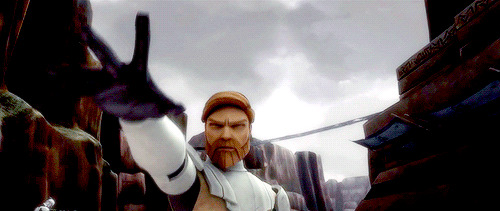
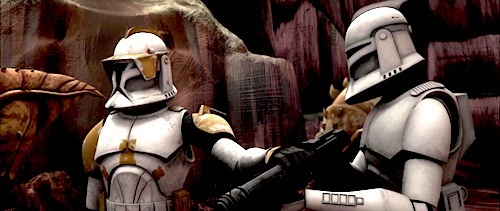
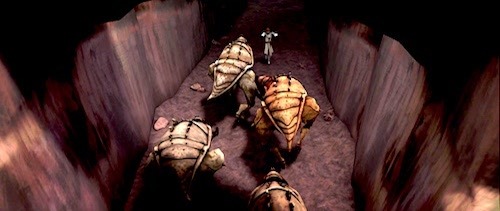
(Caps cribbed from Pan’s blog, because I cannot make another gif, save me, please.)
Henry Gilroy in an Aggressive Negotiations Interview: "Obi-Wan truly is a Jedi in that he’s like, ‘Okay, I’m not going to murder these creatures [in the Ryloth arc of The Clone Wars]. They’re starving to death. They’ve basically been unleashed against these people as a weapon, but it’s not their fault. They’re just doing what they do. They’re just animals who wanna eat.’
"So the idea was–and I think there was an early talk about how, 'Oh, yeah, he’ll go running through them and slicing and dicing them and chop them all up or whatever, and save his guys. And I’m like, 'Yeah, but that’s not really the Jedi way. He’s not just gonna murder these creatures.’
"And I know the threat is [there], to save one life you have to take one, but the idea of him [is]: why can’t Obi-Wan just be more clever? He basically draws them in and then traps them.
"It says something about who the Jedi are, they don’t just waste life arbitrarily. And someone could have gone, 'Oh, yeah, but it would have been badass if he’d just ran in there with his lightsaber spinning and stabbed them all in the head!’ And 'Yeah, you’re right, I guess he could be that, but he’s trying to teach his clones a lesson right then, about the sanctity of life.’
"That is the underlying theme of that entire episode. Which is: A tactical droid is using the people as living shields. Life means nothing to the Separatists. The droids. But life is everything to the Jedi. And even though he doesn’t have to say that, it’s all through the episode thematically.“
It’s also Obi-Wan who teaches Anakin about kindness to mindless creatures in the Obi-Wan & Anakin comic:

"These beasts are nearly mindless, Anakin. I can feel it. They are merely following their nature, they should not die simply because they crossed our path. Use the Force to send them on their way.”
Now, fair enough if you want to say Obi-Wan was taught by Qui-Gon, but also Qui-Gon is dead by that point and Obi-Wan growing into being more mature is his own accomplishment, not Qui-Gon’s, especially given that we see Qui-Gon himself being pretty dismissive to Jar Jar in TPM.
This isn’t unique thing either, Padme is incredibly condescending to Jar Jar in “Bombad Jedi” and expresses clear annoyance with him to C-3PO when sighing over him. Jar Jar is a character you kind of have to warm up to, pretty much the only one we’ve seen consistently being favorable to him is Yoda (and maybe Anakin, though, Anakin doesn’t really interact with him a ton) and Mace Windu warms up to him considerably in “The Disappeared” and even specifically is shown to be teaching him and helping him, which is a huge theme of the Jedi and how much they care.
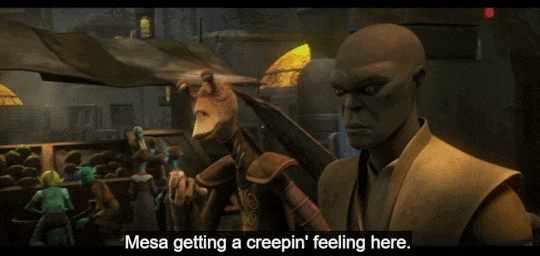
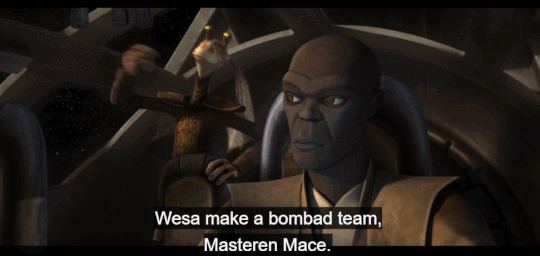
So, ultimately, the point I’m winding my way towards is--the other Jedi do show kindness and consideration to Jar Jar Binks, including characters like Mace Windu, so if you’re judging the Jedi based on that, the conclusion of Qui-Gon somehow being more compassionate and loving is really pretty thoroughly disproved by The Phantom Menace and The Clone Wars themselves.
So, he’s a brother to Anakin eventually but he’s not a father figure. That’s a failing for Anakin. He doesn’t have the family that he needs. He loses his mother in the next film. He fails on this promise that he made, “mother, I’m going to come back and save you”. So he’s left completely vulnerable and Star Wars is ultimately about family.
You could be charitable and say this is just from Anakin’s point of view that it’s a “failing”, but within the context of what Dave’s saying, it’s clearly meant as a more narratively approved take, not just Anakin’s point of view, and I really, really dislike the idea that Anakin--or anyone, really--needs a traditional nuclear family, ie a “mom” and/or a “dad”, or else it’s a “failing” for them.
Setting aside that the idea that Qui-Gon would need to be Anakin’s dad to be kind to hi (which is ?????) is contradicted by The Clone Wars as well. Yes, Qui-Gon is warm with Anakin in several scenes, which is what Dave is presumably drawing on to show that Qui-Gon believed the Jedi should be caring and loving, but you know who else is warm to younglings? OTHER JEDI COUNCIL MEMBERS.
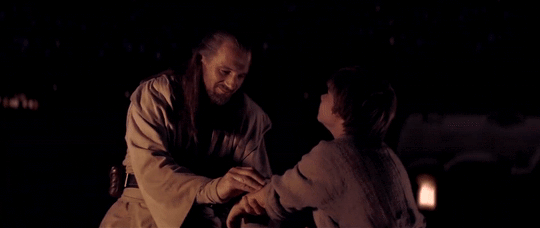
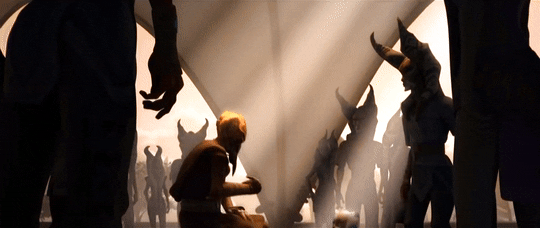
Those two scenes have the exact same kind of warmth to them. Ie, THE JEDI ALL BELIEVED IN BEING LOVING AND KIND, NOT JUST QUI-GON. The things evidenced to show Qui-Gon was loving and kind are evidenced just as much in other Council members, in Dave’s own show.
As a bonus--have Mace Windu, known Jedi Council member, being super kind and loving towards a young Twi’lek girl he just met in a canon comic:
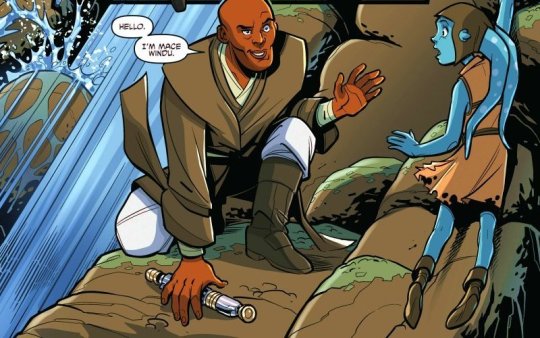
But I know that this is about the way the Council treated Anakin in The Phantom Menace testing scene, but here’s the thing--when I go back and I watch that scene and the Jedi aren’t ever mean to him, they’re neutral in an official testing situation, where they are trying to determine if he’s able to adapt to the Jedi ways. They never once say he’s bad for holding onto his fear, only that he does--which Anakin digs his heels in and gets angry about, he can’t really even admit that he’s afraid and that’s a huge deal for the Jedi.
I’ve made a longer post about it here (and here), but the basic gist is:
- That scene has Yoda giving the famous “Fear leads to the dark side” speech which is almost word for word how George Lucas describes how the Force works, showing the Jedi are narratively correct
- “Confronting fear is the destiny of a Jedi” may be from the sequels, but it is thoroughly supported by the movies and TCW and Rebels and even supplementary canon material, including that the Jedi literally design their tests around both Masters and Padawans for it (Ilum, the Jedi Temple on Lothal, etc.
- Anakin cannot admit to his fears in that TPM scene
- We have examples of Jedi younglings do admit to their fears and the point isn’t not to have them, but to face them--the younglings in “The Gathering” are the most blatant example of this, but it’s also pretty much the entire theme of Jedi: Fallen Order, especially when Cal goes to Ilum to face his fears and get another kyber crystal.
The point isn’t that Anakin--who has very good reasons to be afraid! nothing in the story or the Jedi have said he didn’t!--is wrong or bad, but that he’s not a great fit for the Jedi life because he is “unwilling to accept [Jedi philosophy] emotionally”. And they’re right about this, because this is how George Lucas describes Anakin in commentary:
“The fact that everything must change and that things come and go through his life and that he can’t hold onto things, which is a basic Jedi philosophy that he isn’t willing to accept emotionally and the reason that is because he was raised by his mother rather than the Jedi. If he’d have been taken in his first year and started to study to be a Jedi, he wouldn’t have this particular connection as strong as it is and he’d have been trained to love people but not to become attached to them.” --George Lucas, Attack of the Clones commentary
And so this brings us to A T T A C H M E N T, which, yeah, we’ve been having this discussion forever, but I’m going to state it again: Within Star Wars, ATTACHMENT IS NARRATIVELY A BAD THING. It is consistently tied to possessive, obsessive relationships, to greed and an unwillingness to let things go when it’s time (letting go is a huge theme in Star Wars) and equating love with attachment is fundamentally wrong according to George Lucas’ Star Wars worldbuilding:
“The Jedi are trained to let go. They’re trained from birth,” he continues, “They’re not supposed to form attachments. They can love people-- in fact, they should love everybody. They should love their enemies; they should love the Sith. But they can’t form attachments. So what all these movies are about is: greed. Greed is a source of pain and suffering for everybody. And the ultimate state of greed is the desire to cheat death.” --George Lucas, The Making of Revenge of the Sith
If attachment and love were the same thing, then he would be saying, “They should love their enemies, they should love the Sith. But they can’t love.” The way George makes the distinction shows that, no, attachment and love aren’t the same thing at all, attachment is not caring. Further, there’s another instance of him showing there’s an important distinction between relationships and attachment and the association of attachmets with possession: "Jedi Knights aren’t celibate - the thing that is forbidden is attachments - and possessive relationships.” --George Lucas, BBC News interview
So, yes, when Anakin is attached to people, it is directly tied to obsession, possession, and greed, all things of the dark side:
“He turns into Darth Vader because he gets attached to things. He can’t let go of his mother; he can’t let go of his girlfriend. He can’t let go of things. It makes you greedy. And when you’re greedy, you are on the path to the dark side, because you fear you’re going to lose things, that you’re not going to have the power you need.” --George Lucas, Time Magazine
“But he has become attached to his mother and he will become attached to Padme and these things are, for a Jedi, who needs to have a clear mind and not be influenced by threats to their attachments, a dangerous situation. And it feeds into fear of losing things, which feeds into greed, wanting to keep things, wanting to keep his possessions and things that he should be letting go of. His fear of losing her turns to anger at losing her, which ultimately turns to revenge in wiping out the village. The scene with the Tusken Raiders is the first scene that ultimately takes him on the road to the dark side. I mean he’s been prepping for this, but that’s the one where he’s sort of doing something that is completely inappropriate.“ --George Lucas, Attack of the Clones commentary
ATTACHMENT IS BAD IN STAR WARS AS THEY DEFINE IT.
Finally, I’m going to circle back to:
Because Qui-Gon is different than the rest of the Jedi and you get that in the movie; and Qui-Gon is fighting because he knows he’s the father that Anakin needs. Because Qui-Gon hasn’t given up on the fact that the Jedi are supposed to actually care and love and that’s not a bad thing.
Here’s the thing about this: You know who else, by this logic, Qui-Gon should have been a father to? OBI-WAN KENOBI.
This isn’t said as “Anakin specifically needs a father” (which I think would be an interesting idea to bandy about and I’m not disagreeing, though, it’s complicated because of what Anakin refuses to accept emotionally), it’s said in a bigger context, that Qui-Gon is better than the other Jedi because he understands the need for fathers (and thus this ties into Return of the Jedi) and he’s ahead of the other Jedi, who apparently think loving and caring about people are bad things, but Qui-Gon does not treat Obi-Wan like his son. Or, if he does, he’s not exactly a stellar dad about it.
Within Master & Apprentice, there’s an incredibly consistent theme of how Qui-Gon thinks supportive things about Obi-Wan, but never says them aloud. He thinks he should talk to Obi-Wan about the upcoming decision to be on the Council and then never does. He could have explained why he kept Obi-Wan training the basics but he never does. There are multiple instances showing that Qui-Gon is actually really, really bad at actually handling a young apprentice who needs him to talk to them about important things. Qui-Gon continues this in From a Certain Point of View where he still never talked to Obi-Wan about everything that happened, even after he became a Force Ghost.
Damn, damn, damn. Qui-Gon closed his eyes for one moment. It blocked nothing; the wave of shock that went through Obi-Wan was so great it could be felt through the Force. Qui-Gon hadn’t thought Kirames Kaj would mention the Jedi Council invitation. It seemed possible the soon-retiring chancellor of the Republic might not even have taken much note of information about a new Council member. --Master & Apprentice
That comment finally pierced Qui-Gon’s damnable calm. There was an edge to his voice as he said, “I suspected you would be too upset to discuss this rationally. Apparently I was correct.”
“I thought you said my reaction was understandable,” Obi-Wan shot back. “So why does it disqualify me from hearing the truth?”
Qui-Gon put his hands on his broad belt, the way he did when he was beginning to withdraw into himself. “…we should discuss this at another time. Neither of us is his best self at the present.” --Master & Apprentice
Obi-Wan walked toward the door, obviously outdone. “At the beginning of my apprenticeship, I couldn’t understand you,” he said. “Unfortunately, that’s just as true here at the end.”
Only yesterday they had worked together as never before. How did Qui-Gon manage to get closer to Obi-Wan at the same time he was moving further away?
Just before Obi-Wan would leave the room, Qui-Gon said, “Once, you asked me about the basic lightsaber cadences. Why I’d kept you there, instead of training you in more advanced forms of combat.”
Obi-Wan turned reluctantly to face him again. “I suppose you thought I wasn’t ready for more. The same way I’m not ready to believe in all this mystical—”
“That’s not why.”
After a long pause, Obi-Wan calmed to the point where he would listen. “Then why, Qui-Gon?”
“Because many Padawans—and full Jedi Knights, for that matter—forget that the most basic technique is the most important technique. The purest. The most likely to protect you in battle, and the foundation of all knowledge that is to come,” Qui-Gon said. “Most apprentices want to rush ahead to styles of fighting that are flashier or more esoteric. Most Masters let them, because we must all find our preferred form eventually. But I wanted you to be grounded in your technique. I wanted you to understand the basic cadences so well that they would become instinct, so that you would be almost untouchable. Above all, I wanted to give you the training you needed to accomplish anything you set your mind to later on.”
Obi-Wan remained quiet for so long that Qui-Gon wondered if he were too angry to really hear any of what he’d said. But finally, his Padawan nodded. “Thank you, Qui-Gon. I appreciate that. But—”
“But what?”
“You could’ve said so,” Obi-Wan replied, and then he left. --Master & Apprentice
"I owe you that. After all, I’m the one who failed you.“
"Failed me?”
They have never spoken of this, not once in all Qui-Gon’s journeys into the mortal realm to commune with him. This is primarily because Qui-Gon thought his mistakes so wretched, so obvious, that Obi-Wan had wanted to spare him any discussion of it. Yet here, too, he has failed to do his Padawan justice. --From a Certain Point of View, “Master and Apprentice”
(Further, in Master & Apprentice, Qui-Gon thinks that the Jedi give Rael Averross--who is HUGELY paralleled to Anakin--too many exceptions, were too soft on him because he came to the Jedi later than most and has trouble thinking of them as his family, and he thinks they should have been stricter with him.)
It’s also readily apparent within The Phantom Menace itself:
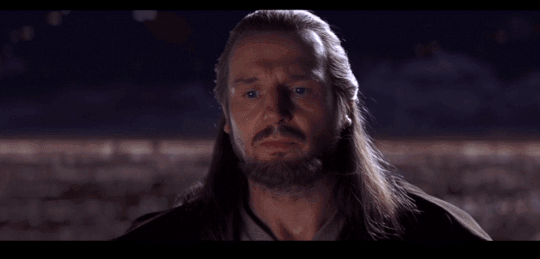
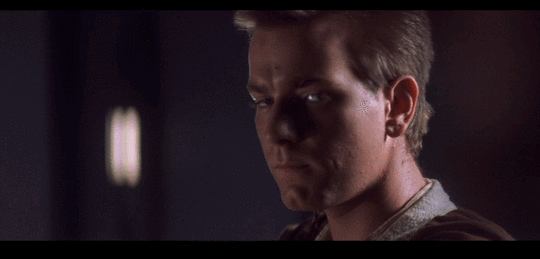
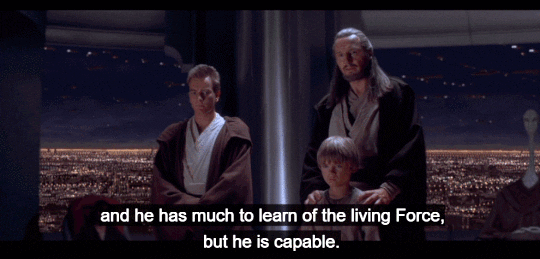

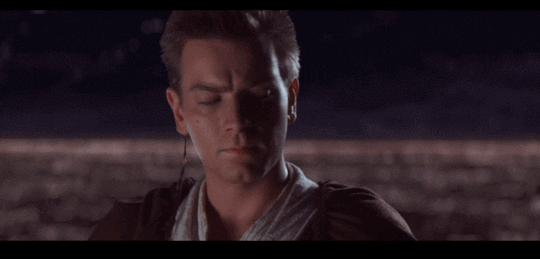
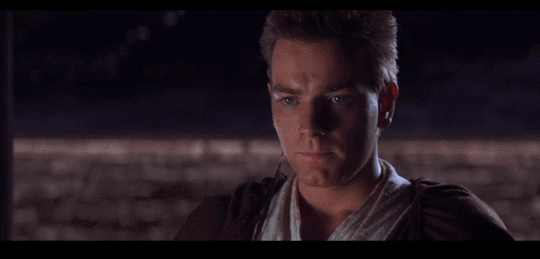
You can take some charitable views of this scene, that Qui-Gon was pushed into a corner where he had few other options (and this is the view I generally take even!), but this is after the entire movie where he’s never once indicated that Obi-Wan was ready, has instead indicated that he still has much to learn (not just of the Living Force, but in general), as well as made it clear that he’s still teaching Obi-Wan, like on the Trade Federation ship.
And I do think Obi-Wan got over this because he understood, because Obi-Wan actually is a very selfless person, he clearly cares (which is furthered by how we see him warm up to Anakin very quickly), but look at their faces.
This was not a good moment, and they do somewhat make up, where Qui-Gon says that Obi-Wan has been a good apprentice, that he’s wiser than Qui-Gon and he’ll be a great Jedi--but if we’re counting that as Qui-Gon being this great Jedi, then you can’t say Obi-Wan failed Anakin, given that we show him doing the exact same thing, except better. He tells Anakin, “You are strong and wise and will become a far greater Jedi than I could ever hope to be.”, echoing Qui-Gon’s words, but also he never threw Anakin aside for someone else.
This is kind of a major undercurrent throughout The Clone Wars, where Obi-Wan never takes another apprentice, where he continues to teach Anakin, to support him, even to the point of occasionally co-Mastering Ahsoka with him. “This has been quite a journey for our Padawan.”
Qui-Gon’s treatment of Obi-Wan in this scene isn’t the worst, he’s kind about it later (though, he never actually specifically apologizes for this), but we can see that this is a moment where Qui-Gon hurts Obi-Wan and knows it.
And you know what George Lucas has to say about Qui-Gon? This:
“So here we’re having Qui-Gon wanting to skip the early training and jump right to taking him on as his Padawan learner, which is controversial, and ultimately, the source of much of the problems that develop later on.” –George Lucas, The Phantom Menace commentary
There’s nothing about Qui-Gon being right or better than the other Jedi, but instead that Qui-Gon’s actions here are a source of much of the problems that develop later on.
So, ultimately, I liked some points Dave made in that speech, it’s a beautiful and eloquent one, but I thoroughly disagree with his interpretation of George’s intentions for Qui-Gon and I thoroughly disagree that that’s what the movies, The Clone Wars (DAVE’S OWN SHOW), and the supplementary canon show about Qui-Gon and the other Jedi. I still stand by my appreciation of Dave’s contributions to SW as a whole, I think he does a really good job at making Star Wars, but he doesn’t always get everything right and this is one thing where I think the canon and George’s commentary show otherwise, as much as I love his desire to defend the prequels’ importance in the story. Because, my friend, I have felt that every single day of my SW life.
968 notes
·
View notes
Text
here, have some mando s2 finale meta
yeah so idrk how everyone tags their spoilers here (I think I hit the big tags), but this contains FULL SPOILERS for the mandalorian, up to and including s2ep8, “Chapter 16: The Rescue.” and just to be upfront, I enjoyed the episode overall and think that there is potential in the new story they seem to be setting up for s3 and beyond. I do not think it completely shit the bed-- the first 40ish (out of a total 45) minutes of the episode were really great, old-school Star Wars stuff. but I 100% understand, and in broad strokes agree with, the criticisms I’ve seen from others. this got way longer than I thought it would so i’m putting it under a cut.
but I think the biggest thing about the mando s2 finale is that it indicates that the production team thinks that they’ve been making an entirely different show than the viewers have been seeing. and I think it comes down to lack of setup of themes, then constructing the finale as if there was that setup, leading to unearned (supposed) catharsis.
I understand how Favreau, Filoni and Co. came to the decision to end it the way they did, and I think that there is a universe where this ending can be satisfying. on its face, if you don’t take emotions into account, it is indeed a satisfying conclusion to the particular story arc of the season. Din has accomplished the task (return the kid to the Jedi) he was given at the end of s1. Grogu was reunited with a Jedi who can and will train him. Din recognizes that he is unable to care for Grogu the way he needs to be cared for (i.e. he knows pretty much nothing about the Force, the Jedi or what “Jedi training” entails) and lets him go with Luke.
unfortunately, this show (and s2 in particular) has been all about the emotions. Even from the very first episode of season 1, when Din shoots IG-11 to prevent him from killing the baby. The closing image of the premiere-- Din reaching into that little cradle with his finger --became an iconic image immediately. the end of s1 literally came out and had the Armorer straight-up tell Din that since the kid is a foundling, until he can be returned to the Jedi, he is his father. and season 2 has only reinforced that-- aside from all the cute single-dad moments of him taking care of Grogu, there’s Ahsoka specifically noting their strong bond in “The Jedi,” and the fact that he willingly (albeit as an absolute last resort) removes his helmet in “The Believer” for the express purpose of obtaining coordinates to Gideon’s ship so that he can rescue the kid. Not to mention other characters (Cara, Mayfeld, etc.) referring to Grogu as Din’s child. do not act like Din was not secretly relieved when Ahsoka went back on her part of the deal and said that she couldn’t train Grogu (BECAUSE HE’S TOO ATTACHED TO HIS PAPA!)
and then the finale comes and expects us to believe that he would willingly a) remove his helmet in a roomful of people, and b) hand over the kid, even to a Jedi. neither of these things make sense with the character of Din Djarin as he’s been presented in the show thus far.
point the first: at no point has the show spent more than 30 seconds at a time forcing Din to reckon with the idea of having to give up the kid. this one’s pretty self-explanatory, and imo is just lazy writing.
point the second: the show never demonstrated a crisis of faith on Din’s part. which is especially weird, since it seems like it set one up and then never followed through on it. Bo-Katan and her crew immediately write Din off as a cultist in “The Heiress,” which seemed at the time to be setting up a thematic arc of Din questioning his faith. (even though Bo-Katan is immeidately hella derisive of Din’s faith to the creed, and “The Rescue further demonstrates her (and Koska too, tbf) to be a Bad Person when she’s shown being space-racist toward Boba.) The show re-canonizes Jango Fett (and Boba, by extension) as Mandalorians, and Boba shows Din the chain code in his armor in “The Tragedy.” But while he doesn’t criticize Din’s dedication to the creed, Boba does seem to be more of the helmet-optional type in his older age. This is the perfect setup to have Din question, at the very least, the helmet-on-always aspect of the creed-- even if he doesn’t take Bo-Katan’s words on their face, Boba’s chain-code bona fides do prove his heritage and he’s seen without the helmet --but nothing really ever comes of it.
Din removing his helmet in a roomful of his friends/allies to say goodbye to Grogu seems like it wants to be a cathartic moment, combining both saying goodbye to his son and decisively violating the creed he has lived by his entire life (and I argue this is different from taking off the helmet in “The Believer” since he does not immediately put it back on at the first opportunity, like he does after the shootout in the officers’ mess), but the show did not do the necessary setup work for that to track as a catharsis.
I don’t necessarily have a problem if Favreau, Filoni, and Co. wanted to wrap up this arc in s2 so they can move in different direction with season 3. Din bested Gideon in combat and earned the darksaber, which now I guess makes him manda’lor (a title he doesn’t even get a chance to fully accept/process before the darktroopers and Luke’s x-wing show up), and now has to contend with Bo-Katan (and possibly other members of the Mandalorian diaspora, but we’ll see.) Pivoting into a show about Mandalorian politics is not necessarily a bad idea. The problem is that, once again, there has been little-to-no buildup in this direction! The show never gave us any indication that Din had any desire to get involved in Mandalorian politics, even at the beginning of the very same episode when he tells Bo-Katan that if she can help him get Grogu back, she can have whatever she wants including the darksaber.
could this have worked? could we see a world in which Din, after meeting other Mandalorians with different relationships to the creed, questioned his own loyalty to it? could we see a world in which Din slowly comes to terms with the prospect of leaving Grogu, and being sad about, it but also realizing that the child will be better off with a Jedi who understands the Force and can train him?
on both those counts, I say absolutely yes! but we would have needed several more episodes’ worth of set-up for this to have landed with the kind of impact “The Rescue” thinks it has. Din Djarin and Grogu’s story seemingly ends with a whimper.
(And on a tangentially related note, I’m more than a little concerned about the post-credits stinger with Boba and Fennec. Do I really like what Temuera Morrison and Ming-Na Wen have done with these characters in just a handful of episodes? Hell yeah, I do! Am I excited to see an OG Star Wars character, who got shafted real hard when Disney acquired Lucasfilm and de-canonized most of the EU, get to be badass again (and be badass while being played by an older (Morrison is like 60) man of color, who’s also returning to a role he kinda-sorta played twenty years ago)? Hell yeah, I am, because I Am A Boba Fett Stan Now, I Guess!)
(I know not to put much stock in the rumors about on-set conflicts during production of s2 and Pedro Pascal allegedly leaving the show, since they’ve been publicly rebuked by the man himself and multiple entertainment-news articles I’ve seen indicate he’s confirmed by sources to return for s3. But the increased prominence of another Mandalorian character in the latter part of this season, coupled with the announcement that The Book of Boba Fett will debut in December 2021, aka the same time frame as Mando s3, does have me a smidge on edge about the possibility of making this show into an anthology with s1-2 focused on Din and s3 (at least) focused on Boba. Sure, Din Djarin is “The Mandalorian” of the title, but he’s by no means the only Mandalorian on the show.)
tl;dr: s2 of the mandalorian sets up a lot of interesting thematic material, then doesn’t follow up on it, but constructs its ending as if it did. and that’s why I think it feels uniquely unsatisfying to a lot of fans.
#the mandalorian#the mandalorian spoilers#star wars#star wars meta#the mandalorian meta#mando meta#mando spoilers#meta#mando#shy.txt
3 notes
·
View notes
Text
Ok thats it. Salty rant time. Be warned this is gonna get long so its probably gonna go under a read more. Lets start with some quick misconceptions I see about Satine. Ima break this down bit by bit because I Am Tired. Satine’s government is not about not allowing anyone to be in touch with their culture. It’s about building a culture of violence only in the name of defense. Lets start with the easiest stuff to tackle and i’ll get to the deeper stuff as we go. (warning: i get real salty)
1. “Inaction is never ok. Satine’s pacifist ideals are naive and stupid. You can’t just choose not to act.”
Firstly, ideas like this imply Satine is not aware of the fact that neutrality is a conscious decision (rush loving hell brain “if you choose not to decide, you still have made a choice) Satine knows this. She has decided not to get involved for a reason.
And you know what that reason is? Her planet is practically dead, forests are nearly gone, the air quality is terrible, and most of her people are dead. Mandalore can literally not sustain another war. It is falling apart. That alone is a good enough reason for neutrality. Mandalore would literally be destroyed if they joined the war effort, so lets get that straight right here and now.
“Well pacifism is still stupid and Satine was naive for believing it would ever work.”
Firstly, don’t you think you would be a little turned off violence too if you saw most of your people and your family slaughtered? yeah? thats what i thought. (look i know that was salty but seriously come on)
Not to mention Satine has never advocated pacifism to the point of not defending ones self. She advocates for always trying to use ones words first, but she has blatantly said just because she is a pacifist does not mean she won’t defend herself. She carries a deactivator pistol, and her guards all have electrostaffs.
And before anybody is like ‘oh so she can be armed but her people can’t?’ that is literally never even implied y’all like. the REACHING- ahem. We see in her first episode the concordian has a gun, and presumably if no one was allowed weapons there would be a check for someone coming to the capital of mandalore, the capital CITY even. But assuming somehow he just. managed to smuggle weapons in, it is also later said that offworlders are not allowed their weapons, thus also implying mandalorians are allowed their weapons.
I’m quite sure theres more I’m missing but the point is: she has never denied anyone the right to defend themselves.
2. “In rebels all of the exiled mandalorians were poc. satine is racist.”
Ok, this one is gonna be a hard one for me to tackle especially being white. I don’t want to sound like I’m not taking this concern seriously but. That is literally not what Filoni was trying to establish at all. I’m not going to deny there is definitely racism going on there, but it can all be traced back to Filoni (who has said this) not wanting to make more character designs. Mandalorians are known for their diversity and he said he did not want to work on different designs so he basically just made a women and a men model and copy and pasted.
Was it wrong? Definitely. Was it stupid? Oh boy was it ever. Was it ever meant to be a statement showing us how racist satine is? no.
The exiles we see are from REBELS and there are considerable fewer models and they probably realized they had to make up for what they pulled in tcw.
Anyone else notice how the Kryze clan did not take off their helmets? Thats very likely because they did not want to contradict what we saw in tcw but nor did they want to get into a bunch more trouble for showing the kryze clan as blonde hair and blue eyed. (full disclaimer thats just a theory on my part though.)
3. the final and big one “Satine was a dictator who was committing cultural genocide because she exiled death watch. She didn’t allow people to practice their warrior ways. Thats what mandalorians are, satine is bad blah blah”
Ok you know what I can kind of understand that some people must have missed some pieces of the episodes or something but like. Frankly there is some real clownery in this. Mainly because:
“Our warriors were exiled to Concordia, they died out years ago.”
Ok lets tackle this one part out of time. Firstly, although yes i get why people find it upsetting that they were exiled, this would have been right after the war. The new mandalorians won, a larger portion of mandalorians wanted peace rather than their warrior ways of the past. And really, can you blame them? As established earlier, the constant war has been destroying the planet. Not to mention the wars killed most of Satine’s people, so whatever warriors that were sent there? There weren’t many.
And secondly? ‘they died out years ago’ if they have already died out, this implies they were exiled long before Satine would have assumed the throne. Given, her father, the duke may very well have been who exiled them, but she was not directly responsible. Is that an excuse? No not entirely, maybe when she took on the throne after her fathers death she should have done something, but we can’t even know if the warriors were alive by then.
(Also if it had been the other way around, and the true mandalorians had won, I have doubts the new mandalorians would have simply been exiled and not killed. But thats merely speculation on my part.)
“But kassie! what about the mandalorian civil war! Satine was around for that!”
Yes, and that was the new mandalorians fighting each other. That was not the true mandos, that was what we now know as death watch. They wanted to return to what their culture was before, but as I previously established this was not sustainable for mandalore.
Death watch was the very worst of what the mandalorians of old were, they were simply war hungry extremists. They were not the true mandalorians people seem to think they were, they were a totally different group of people. The true mandalorians had mostly (if not completely) died out by this point.
Satine ended the war, not through strongarming anyone or being a dictator and going ‘well i have the power here listen to me’ no she approached the clan leaders and all of them were tired of the war. They all agreed to end it, and THEN death watch was banished to Concordia by Satine.
Given, Satine did seem to naively believe death watch had given up its fight, but that’s it.
Satine then worked to restructure Mandalore’s government into a more democratic one (theres a reason she is a duchess and not a manda’lor guys come on) she wanted to ensure a Mandalore that was united, which is also why Bo dedicates her rule to her sister for the record, because she does what Satine was trying to do, which was unite everyone.
Lets look at the definition of dictator shall we?
Dictator: a ruler with total power over a country, typically one who has obtained control by force.
This is. Literally not Satine. Not only did she not obtain it by force, she is not the sole ruler (which is what manda’lor literally translates to by the way) she has advisors and senators, she has a council she must confer with, which we all see in show. Also the simple fact that she is the duchess and not a manda’lor implies less power.
So in conclusion: Satine is someone who has lost so freaking much, and she saw suffering and she tried to stop the suffering, she tried to keep more people from suffering the fate she did. She was trying to keep Mandalore from literally collapsing on itself.
Did she always go about it in a perfect way? No that is not what I am saying at all! But she gets a lot more flack than she strictly should considering all she did was do everything she could for her people. She tried really hard to be a responsible leader, she tried so hard to keep everyone together. She wanted nothing more than peace, and maybe thats naive, but I think its a future worth fighting for, even if your way of fighting is with your words rather than a blaster.
I mean after all, by keeping out of the war she was also one of the few people not playing directly into Palpatine’s hands. In fact, she tends to throw a wrench in his gears. But that’s another essay for another time.
Thanks if you made it through this rant but I had to get it off my chest. I’m really tired of all these misconceptions. If you have any further questions feel free to pop into my inbox and ask! I’ll answer as best as I can, considering there’s actually very little canon material on this haha.
#salt shit#here it is. the essay#𝒫𝒶𝓎 𝒩𝑜 𝒜𝓉𝓉𝑒𝓃𝓉𝒾𝑜𝓃 𝒯𝑜 𝒯𝒽𝑒 𝐵𝑒𝒶𝓃 𝐵𝑒𝒽𝒾𝓃𝒹 𝒯𝒽𝑒 𝐿𝒶𝓅𝓉𝑜𝓅 (ooc)#save tag#i dont even really know how to tag this lmao#salt essay#i guess dashldjksadhlk
3 notes
·
View notes